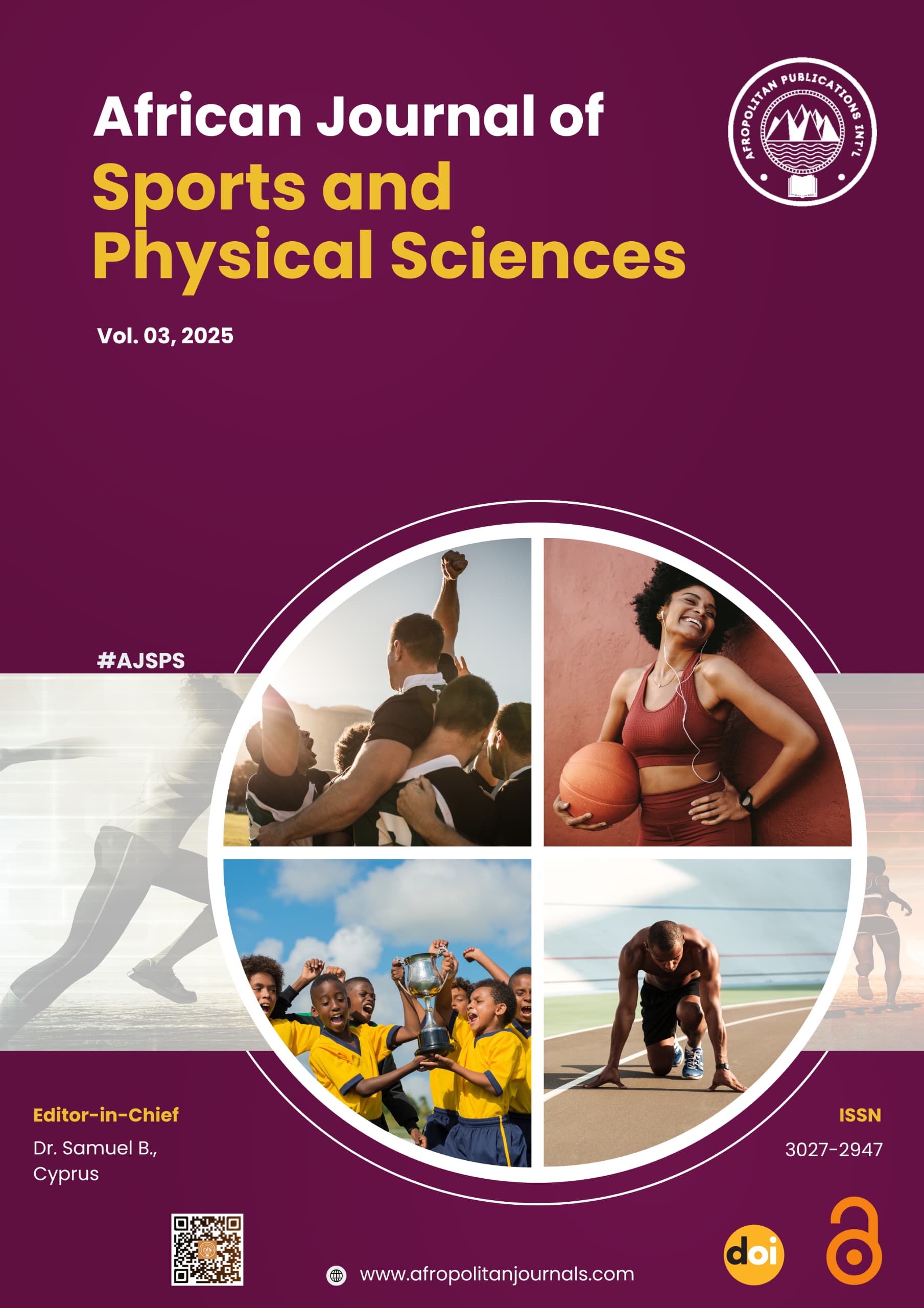Hydration Knowledge and Fluid Replacement Strategies among Athletic Coaches in Ghana
Main Article Content
Abstract
Adequate hydration is crucial for athletic performance as it affects thermoregulation, cardiovascular function, and endurance. Coaches play a key role in ensuring proper hydration, yet limited data exist on their knowledge and practices in low- and middle-income countries (LMICs). This study assessed hydration knowledge and fluid replacement strategies among athletic coaches in Accra, Ghana. A cross-sectional survey was conducted among 68 coaches from football, basketball, athletics, and volleyball. Data was collected using a structured questionnaire on hydration knowledge, fluid replacement practices, and information sources. Analyses for associations between knowledge scores and demographic variables were conducted using chi-square tests and regression analysis. Only 4.4% of coaches achieved a passing hydration knowledge score (≥80%), 67.65% had moderate knowledge and 27.9% had low knowledge. Questions related to indicators of dehydration, appropriate fluid intake, and the impact of climate conditions on hydration needs were frequently answered wrongly by respondents. Despite the importance of hydration, 45.6% of coaches provided no fluids to athletes before training, and 50% did not offer fluids post-training. Social media was the primary source of information on hydration (91.2%), and professional organizations and health professionals were the least consulted sources. Statistical analyses showed no significant associations between knowledge scores and demographic factors such as age, educational level, sports specialty, or coaching experience. Findings highlight substantial knowledge gaps and inadequate hydration practices among the coaches. Targeted educational interventions planned in collaboration with sports nutrition experts are needed to improve hydration strategies and practices among coaches in Ghana.
Article Details
Copyright (c) 2025 Gabriel Gomashie, Frank Ekow Atta Hayford, Rebecca Steele-Dadzie, Laurene Boateng (Author)

This work is licensed under a Creative Commons Attribution 4.0 International License.
Belval, L. N., Hosokawa, Y., Casa, D. J., Adams, W. M., Armstrong, L. E., Baker, L. B., Burke, L., Cheuvront, S., Chiampas, G., González-Alonso, J., Huggins, R. A., Kavouras, S. A., Lee, E. C., McDermott, B. P., Miller, K., Schlader, Z., Sims, S., Stearns, R. L., Troyanos, C., & Wingo, J. (2019). Practical Hydration Solutions for Sports. Nutrients, 11(7), 1550. https://doi.org/10.3390/nu11071550 DOI: https://doi.org/10.3390/nu11071550
Charway, D., & Åse Strandbu. (2023). Participation of girls and women in community sport in Ghana: Cultural and structural barriers. International Review for the Sociology of Sport, 59(4). https://doi.org/10.1177/10126902231214955 DOI: https://doi.org/10.1177/10126902231214955
Cheuvront, S. N., & Kenefick, R. W. (2014). Dehydration: physiology, assessment, and Performance Effects. Comprehensive Physiology, 4(1), 257–285. https://doi.org/10.1002/cphy.c130017 DOI: https://doi.org/10.1002/j.2040-4603.2014.tb00543.x
Couture, S., Lamarche, B., Morissette, E., Provencher, V., Valois, P., Goulet, C., & Drapeau, V. (2015). Evaluation of Sports Nutrition Knowledge and Recommendations Among High School Coaches. International Journal of Sport Nutrition and Exercise Metabolism, 25(4), 326–334. https://doi.org/10.1123/ijsnem.2014-0195 DOI: https://doi.org/10.1123/ijsnem.2014-0195
Depetris-Chauvin, E., Durante, R., & Campante, F. (2020). Building Nations through Shared Experiences: Evidence from African Football. American Economic Review, 110(5), 1572–1602. https://doi.org/10.1257/aer.20180805 DOI: https://doi.org/10.1257/aer.20180805
Dube, A., Gouws, C., & Breukelman, G. (2022). Effects of hypohydration and fluid balance in athletes’ cognitive performance: a systematic review. African Health Sciences, 22(1), 367–376. https://doi.org/10.4314/ahs.v22i1.45 DOI: https://doi.org/10.4314/ahs.v22i1.45
European Federation of the Association of Dietitians. (2023). Annual Hydration for Health Conference – EFAD. Efad.org. https://www.efad.org/annual-hydration-for-health-conference/
Frates, B. (2024). From Over-worked, Over-stressed, and Over-weight to a Healthy Lifestyle: Lifestyle Medicine Basics for Coaches | Institute of Coaching. Instituteofcoaching.org. https://instituteofcoaching.org/blogs/over-worked-over-stressed-and-over-weight-healthy-lifestyle-lifestyle-medicine-basics-coaches
Geijer, J., Pitney, W., & Brandenburg, J. (2009). Fluid Replacement Knowledge and Sources of Hydration Information among Illinois High School Athletic Coaches: A Pilot Study. Internet Journal of Allied Health Sciences and Practice. https://doi.org/10.46743/1540-580x/2009.1256 DOI: https://doi.org/10.46743/1540-580X/2009.1256
Ghana Web. (2017, December 17). Ghana Football Coaches Association holds first ever Congress. GhanaWeb. https://www.ghanaweb.com/GhanaHomePage/SportsArchive/Ghana-Football-Coaches-Association-holds-first-ever-Congress-610441
Kalra, D. (2023). Overhydration: A boon or bane. Indian Journal of Pharmacy and Pharmacology, 10(2), 73–75. https://doi.org/10.18231/j.ijpp.2023.017 DOI: https://doi.org/10.18231/j.ijpp.2023.017
Kavouras, S. A., Arnaoutis, G., Makrillos, M., Garagouni, C., Nikolaou, E., Chira, O., Ellinikaki, E., & Sidossis, L. S. (2011). Educational intervention on water intake improves hydration status and enhances exercise performance in athletic youth. Scandinavian Journal of Medicine & Science in Sports, 22(5), 684–689. https://doi.org/10.1111/j.1600-0838.2011.01296.x DOI: https://doi.org/10.1111/j.1600-0838.2011.01296.x
Kobayashi, K., & Yasuda, N. (2022). Effectiveness of hydration education to improve hydration status during summer seasons in adolescent female indoor-sport athletes. Journal of Science and Medicine in Sport, 25, S8. https://doi.org/10.1016/j.jsams.2022.09.127 DOI: https://doi.org/10.1016/j.jsams.2022.09.127
Kubayi, A., Coopoo, Y., & Toriola, A. (2018). Analysis of sport science perceptions and research needs among South African coaches. South African Journal of Sports Medicine, 30(1), 1–4. https://doi.org/10.17159/2078-516x/2018/v30i1a4240 DOI: https://doi.org/10.17159/2078-516X/2018/v30i1a4240
Martin, C. (2024). Advanced Technologies in Monitoring and Evaluating Athlete Performance: A Game-Changing Evolution. West London Sport. https://www.westlondonsport.com/sport/advanced-technologies-in-monitoring-and-evaluating-athlete-performance-a-game-changing-evolution
Onwumechili, C. (2019). Africa’s elite football: Structure, politics, and everyday challenges. Https://Www.routledge.com/Africas-Elite-Football-Structure-Politics-And-Everyday-Challenges/Onwumechili/P/Book/9781032239651?Srsltid=AfmBOoqpqbPrilhBKc-LZcZmfP4ErsNQr5BVRig0Nyp0mlBOgZYbO5Zz. DOI: https://doi.org/10.4324/9780429029059
Ransone, J., & Dunn-Bennett, L. R. (2025). Assessment of First-Aid Knowledge and Decision Making of High School Athletic Coaches. Journal of Athletic Training, 34(3), 267. https://pmc.ncbi.nlm.nih.gov/articles/PMC1322921/
Shirreffs, S. M., & Sawka, M. N. (2011). Fluid and electrolyte needs for training, competition, and recovery. Journal of Sports Sciences, 29(sup1), S39–S46. https://doi.org/10.1080/02640414.2011.614269 DOI: https://doi.org/10.1080/02640414.2011.614269
World Health Organization. (2024). Heat and health. World Health Organization. https://www.who.int/news-room/fact-sheets/detail/climate-change-heat-and-health

